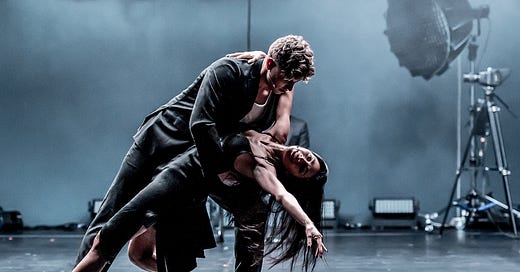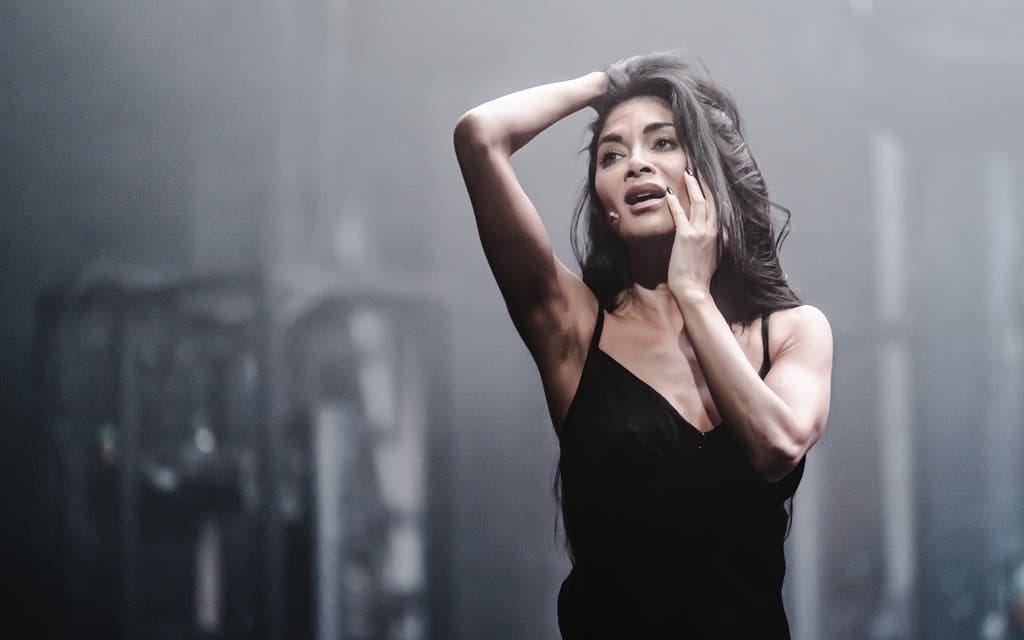Review: Sunset Boulevard, Savoy Theatre
Jamie Lloyd directs a stark new version of the Andrew Lloyd Webber classic, focusing on Norma's inner life to the detriment of everything else.
For all their success and entertainment value, Andrew Lloyd Webber musicals are not the kind of dramatic works one expects British drama teachers to be flogging to their GCSE students. This production of Sunset Boulevard, however, is textbook Theatre Studies fodder — with school groups lining up outside the Savoy, jotters in hand. Brecht would be smiling down at director Jamie Lloyd, if it weren’t for the fact that smiling might make us all too comfortable.
The critics are right to say that you’ve never seen a production of Sunset Boulevard like this. It is undoubtedly a remarkable piece of theatre, particularly for its abnegation of all set and props and use of film amongst the live action. You’ve probably already heard about the Act Two opening number that sees the spineless and sarcastic Joe Gillis (an outstanding performance from Tom Francis) sing the title song live from outside the theatre, returning on stage for the final note to a roar of approval from the auditorium.
Rachel Tucker (Nicole Scherzinger’s alternate) does a commanding job as the erstwhile silent screen star Norma Desmond, her voice demonstrating all the precision and power — With One Look is spine-tingling — that made her one of the world’s longest-running Elphabas. She is supported by a tremendously strong cast, particularly David Thaxton as Desmond’s devoted butler, Max, whose voice has the rich, virtuosic quality befitting that of a fallen star of an earlier, more meaningful era.
The music is as good as (if not better than) it has ever sounded; Conductor Alan Williams and his 17-piece orchestra bring out every moment of romanticism in Webber’s score to its most luxurious expression. Set against the sparseness of the stage, the music takes on a larger, more meaningful role, and seems to envelop the entire space: the effect is that of total immersion in the sound. The sweeping, filmic motifs of the score recreate a golden age of Hollywood that is entirely absent in Lloyd’s production, and one might imagine that it is actually Norma’s internal soundtrack — as idealised and inaccurate as her dreams of a return to motion pictures.
Lloyd has created a production that is hyper-focused on Norma’s inner life, analysing in searing detail her narcissism and anguish at her fade from stardom. This is achieved particularly well in the scene in which she watches one of her old movies, her face merging with and re-emerging from that of her younger self on screen, eyes wide and searching, as though trying to understand how it is that she stopped being 17. This perspective is the production’s calling card, but also its major drawback. Although it provides searing and unpleasant insight into a woman’s delusions (and offers the leading lady ample space to lose it), the lack of context or detail elsewhere means it doesn’t offer audiences much else.
The ensemble, dressed in indistinguishable pieces of black sportswear, are practically faceless: the singing may be strong, but their performances are unanimously devoid of emotion (apart from when they all break character and start smiling in the title number, a frustrating piece of meta-theatrics that leads to nothing). In key points of tension, rather than showing the audience how the supporting characters feel through action or feeling, Lloyd treats us to long, indecipherable stares down the camera lens. Too Much In Love To Care — the soaring Act Two love duet between Joe and fellow writer Betty (Grace Hodgett Young) — is so lacking in chemistry it’s almost embarrassing to watch. Joe is obviously a selfish jerk, but his final betrayal would pack more of a punch if he’d at least pretended to be in love in the first place.
There is no question that Lloyd has created a commanding piece of theatre, one that will be talked about for years to come. It thrives on contrasts: lush music and a bare stage, unbearable intimacy and uncomfortable distance, an expressive leading lady and an expressionless ensemble. Norma’s extremes of emotion, set against purposeful blankness elsewhere, seem even more deranged, and by the final scene the discomfort in the auditorium is palpable. The production is, of course, extremely (and occasionally eyerollingly) self-aware, and is so deliberately artless in places that it becomes hard to suppress a chuckle. At one point, three characters, with no context, set or props to help them, simply run around the stage in circles to represent a moment of heightened tension.
Ultimately, this production has “star vehicle” written all over it, the rest of the characters brushed off into almost irrelevance. With its hyper-focus on Norma both on stage and the huge projection screen, the butler Max may as well have directed it. It feels as though it has been created purposefully for Nicole Scherzinger to give the performance of a lifetime, which may seem oddly like life mirroring art, but will no doubt satisfy her fans. Anyone expecting a glossy Andrew Lloyd Webber revamp will likely leave wondering what it is they’ve just witnessed. But they will be humming the tunes nonetheless.





